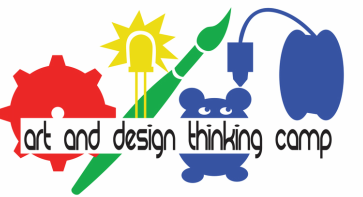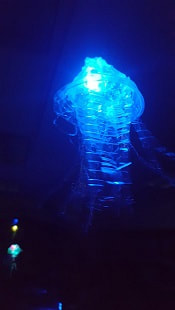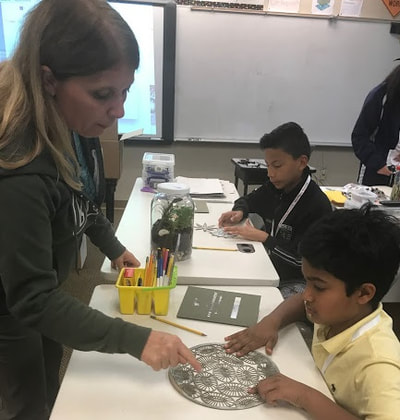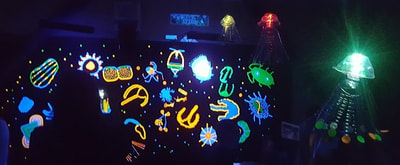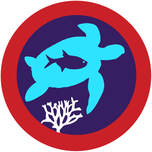Week 1 - Art and the Environment
June 24 to June 28
Instructor: Michele Guieu
The region we live in, The San Francisco Bay Area, is beautiful and fragile and needs our attention and care. Discover the importance of water and the consequences of human activity on our watershed and on the ocean. From individual work to a group installation, campers make art and design projects, exploring mini-landscaping, basic circuitry and soldering, and graphic design.
Monday (June 24)
9:00am Intros
9:30am Ice Breaker activity: Make a mini mobile from trash collected around the San Francisco Bay.
Campers will think about the San Francisco Bay and the important role each of us need to play to protect it.
10:15am BREAK
10:30am What is Design Thinking? Maker Journals - Human activity can affect the water cycle.
Why is the water cycle so important for the balance of ecosystems?
~ Campers will build a terrarium with small house plants, soil, charcoal and gravel.
They will decorate it with personal elements like rocks or pieces of wood, creating a mini landscape.
~ Campers will create a desertscape using plants that require minimal water
~ Campers will create clay creature to inhabit their terrarium or desertscape.
12:00pm LUNCH
12:45pm Review weekly projects
1:00pm TINKER TIME:
Cranky Contraptions
A fun way to make simple mechanisms and motion.
Campers explore up and down motion making contraptions from plastic trash collected around the Bay
to make a statement about plastic pollution.
2:30pm Daily Camper Assessment
2:45pm Clean Up
3:00pm Camper Pick Up
Photos
Tuesday (June 25 )
9:00am Warm Up Activity: Light Up Cards
Introduction to paper circuitry and Chibitronics
Make a light Up card with paper cuts and LEDs
9:30am
10:15am BREAK
10:30am Activity: Light Up Jellyfish
Campers will make a Jellyfish that lights up with recycled plastic bottles (circuitry with copper tape + LED)
11:30am Continue Paper Circuitry projects
Activity/Lesson: Continue Symbols about Water
12:00pm LUNCH
12:45pm Continue morning activity:
Discussion about the symbols: Review, feedback.
1:00pm TINKER TIME
2:30pm Daily Camper Assessment
2:45pm Clean Up
3:00pm Camper Pick Up
Photos
Wednesday (June 26 )
9:00am Warm Up Activity: Nature Prints
Make compositions with photographic paper using plants from the garden
9:30am Activity/Lesson: Data Mapping
Using a map as a base, campers visualize how to express information about the area on the map with LEDs.
Campers use Makecode Chibitronics code blocks and a chibichip to program the LEDs on the map,
which will light up in a specific sequence.
10:15am BREAK
10:30am Activity/Lesson: Continue Data Mapping activity
12:00pm LUNCH
12:45pm Continue morning activity:
Discussion about Data Mapping, the Chibichip, and feedback.
1:00pm TINKER TIME
2:30pm Daily Camper Assessment
2:45pm Clean Up
3:00pm Camper Pick Up
Photos
Thursday (June 27 )
9:00am Warm Up Activity:
9:30am Activity/Lesson:
10:15am BREAK
10:30am Activity/Lesson: Endangered Species: Ocean Shadow Box (circuitry - soldering)
Campers will learn about the impact of human activities on marine species and the major threats
marine species are facing such as: over-fishing/unsustainable fishing, inadequate protection
(not enough sanctuaries), tourism and development, ship strikes, oil and gas pollution,
consequences of aquaculture (pollution), and climate change (change in ocean temperatures).
Campers will learn how to draw a recognizable shape to create a silhouette.
Campers will also explore simple circuitry by constructing a simple circuit, with LED, battery, conductive tape,
and a switch system within the shadow box.
12:00pm LUNCH
12:45pm Continue morning activity: Discussion about the boxes and the Light Up Jellyfish
1:00pm TINKER TIME
2:30pm Daily Camper Assessment
2:45pm Clean Up
3:00pm Camper Pick Up
Photos
Friday (June 28)
9:00am Warm Up Activity: Mini Plankton Soup with Bio Ink from The Tech Museum.
Plankton are like ‘the canary in the coal mine of climate change’.
By monitoring them, scientists learn about the ocean’s health.
What if bio inks could be part of the solution,
by being a great alternative to harsh chemicals needed to make art supplies?
Campers will create their own petri dish art using stamps of microscopic ocean life and
bio ink - a natural bio-pigment produced by living bacteria.
9:30am Activity/Lesson: Make Plankton with Cardboard
Campers will create elements for a collective mural representing an ensemble of enlarged plankton organisms.
~ Why is plankton so important?
~ Why should we care about plankton?
~ Why should we take the time to create a mural that is a tribute to plankton?
10:15am BREAK
10:30am Activity/Lesson: Continue Plankton activity
12:00pm LUNCH
12:45pm Complete weekly projects
1:00pm TINKER TIME – ONLY if projects are complete
2:30pm Daily Camper Assessment
Weekly Camper Survey
2:45pm Clean Up and Prep for Showcase
3:30pm Student Showcase
4:30pm Camper Pick Up
Photos
June 24 to June 28
Instructor: Michele Guieu
The region we live in, The San Francisco Bay Area, is beautiful and fragile and needs our attention and care. Discover the importance of water and the consequences of human activity on our watershed and on the ocean. From individual work to a group installation, campers make art and design projects, exploring mini-landscaping, basic circuitry and soldering, and graphic design.
Monday (June 24)
9:00am Intros
9:30am Ice Breaker activity: Make a mini mobile from trash collected around the San Francisco Bay.
Campers will think about the San Francisco Bay and the important role each of us need to play to protect it.
10:15am BREAK
10:30am What is Design Thinking? Maker Journals - Human activity can affect the water cycle.
Why is the water cycle so important for the balance of ecosystems?
~ Campers will build a terrarium with small house plants, soil, charcoal and gravel.
They will decorate it with personal elements like rocks or pieces of wood, creating a mini landscape.
~ Campers will create a desertscape using plants that require minimal water
~ Campers will create clay creature to inhabit their terrarium or desertscape.
12:00pm LUNCH
12:45pm Review weekly projects
1:00pm TINKER TIME:
Cranky Contraptions
A fun way to make simple mechanisms and motion.
Campers explore up and down motion making contraptions from plastic trash collected around the Bay
to make a statement about plastic pollution.
2:30pm Daily Camper Assessment
2:45pm Clean Up
3:00pm Camper Pick Up
Photos
Tuesday (June 25 )
9:00am Warm Up Activity: Light Up Cards
Introduction to paper circuitry and Chibitronics
Make a light Up card with paper cuts and LEDs
9:30am
10:15am BREAK
10:30am Activity: Light Up Jellyfish
Campers will make a Jellyfish that lights up with recycled plastic bottles (circuitry with copper tape + LED)
11:30am Continue Paper Circuitry projects
Activity/Lesson: Continue Symbols about Water
12:00pm LUNCH
12:45pm Continue morning activity:
Discussion about the symbols: Review, feedback.
1:00pm TINKER TIME
2:30pm Daily Camper Assessment
2:45pm Clean Up
3:00pm Camper Pick Up
Photos
Wednesday (June 26 )
9:00am Warm Up Activity: Nature Prints
Make compositions with photographic paper using plants from the garden
9:30am Activity/Lesson: Data Mapping
Using a map as a base, campers visualize how to express information about the area on the map with LEDs.
Campers use Makecode Chibitronics code blocks and a chibichip to program the LEDs on the map,
which will light up in a specific sequence.
10:15am BREAK
10:30am Activity/Lesson: Continue Data Mapping activity
12:00pm LUNCH
12:45pm Continue morning activity:
Discussion about Data Mapping, the Chibichip, and feedback.
1:00pm TINKER TIME
2:30pm Daily Camper Assessment
2:45pm Clean Up
3:00pm Camper Pick Up
Photos
Thursday (June 27 )
9:00am Warm Up Activity:
9:30am Activity/Lesson:
10:15am BREAK
10:30am Activity/Lesson: Endangered Species: Ocean Shadow Box (circuitry - soldering)
Campers will learn about the impact of human activities on marine species and the major threats
marine species are facing such as: over-fishing/unsustainable fishing, inadequate protection
(not enough sanctuaries), tourism and development, ship strikes, oil and gas pollution,
consequences of aquaculture (pollution), and climate change (change in ocean temperatures).
Campers will learn how to draw a recognizable shape to create a silhouette.
Campers will also explore simple circuitry by constructing a simple circuit, with LED, battery, conductive tape,
and a switch system within the shadow box.
12:00pm LUNCH
12:45pm Continue morning activity: Discussion about the boxes and the Light Up Jellyfish
1:00pm TINKER TIME
2:30pm Daily Camper Assessment
2:45pm Clean Up
3:00pm Camper Pick Up
Photos
Friday (June 28)
9:00am Warm Up Activity: Mini Plankton Soup with Bio Ink from The Tech Museum.
Plankton are like ‘the canary in the coal mine of climate change’.
By monitoring them, scientists learn about the ocean’s health.
What if bio inks could be part of the solution,
by being a great alternative to harsh chemicals needed to make art supplies?
Campers will create their own petri dish art using stamps of microscopic ocean life and
bio ink - a natural bio-pigment produced by living bacteria.
9:30am Activity/Lesson: Make Plankton with Cardboard
Campers will create elements for a collective mural representing an ensemble of enlarged plankton organisms.
~ Why is plankton so important?
~ Why should we care about plankton?
~ Why should we take the time to create a mural that is a tribute to plankton?
10:15am BREAK
10:30am Activity/Lesson: Continue Plankton activity
12:00pm LUNCH
12:45pm Complete weekly projects
1:00pm TINKER TIME – ONLY if projects are complete
2:30pm Daily Camper Assessment
Weekly Camper Survey
2:45pm Clean Up and Prep for Showcase
3:30pm Student Showcase
4:30pm Camper Pick Up
Photos
